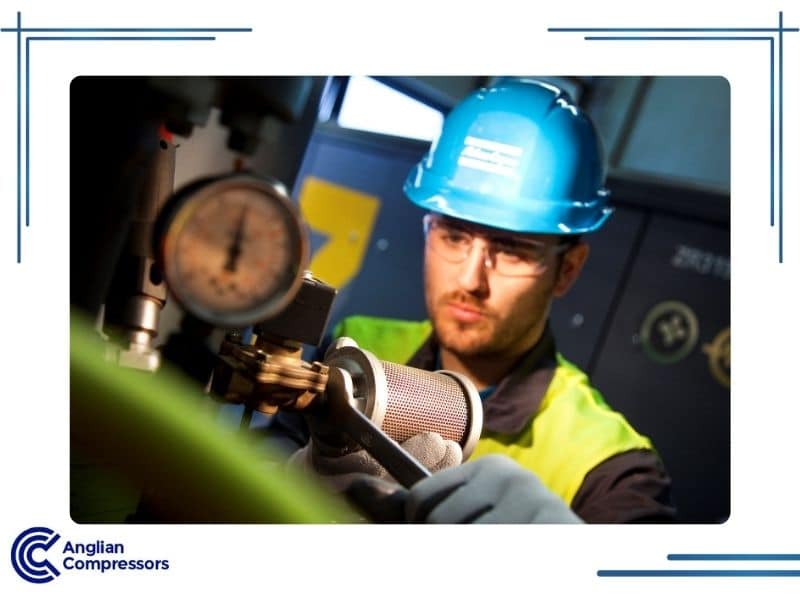Five Signs Your Air Compressor Needs Replacing
Managing your air compressor and recognising when it needs replacing helps maintain overall efficiency. Given that over three-quarters of air compressor costs are attributed to electricity consumption, optimal performance is necessary to reduce expenses.
Ignoring declining machinery performance creates added risk to operations. Also, the increased likelihood of breakdowns and reduced production quickly turns an ageing compressor into more of a liability than a business asset.
To better understand when your air compressor system is struggling, here are five signs that indicate it may need to be replaced.
1. Decreased Efficiency and Increased Operational Costs
Running older compressors causes operational inefficiencies. It also puts greater demand on power usage, driving higher energy costs. Added wear to machinery compared to using a modern air compressor is typical as well.
One indicator of these issues is a gradual reduction in the maximum achievable air pressure. Another warning sign is a fluctuating, inconsistent airflow rate.
When productivity is affected because your air compressor is ageing, operators often opt to run for longer to substitute for declines in air pressure or air production. This only leads to increased electricity bills and puts added strain on an air pressure system already struggling. These steps can accelerate the eventual failure of the equipment and likely result in more costly and frequent breakdowns before this occurs.
Debating whether to repair or replace a compressor becomes a repeated discussion at the managerial level. A failing compressor is a hindrance; troubleshooting issues, suffering breakdowns, and arranging for repairs are costly.

2. Frequent Repairs and Downtime
It is easy to become accustomed to an increasing number of compressor issues. While staff may express frustration internally when the compressor is down for repairs again, summarily dismissing it as par for the course is a common response. However, such incidents should be actively avoided by keeping track of all repair activities.
Only by recording the number of repairs, what failed, the parts required to fix the issue, and estimated production losses (or time lost) is it possible to acknowledge the reality of the situation. Rising repair costs and increased repair instances almost always precede the need to replace your compressor.
It is useful to keep a ready supply of commonly needed parts for repairs. This is true regardless of compressor age. By keeping these in stock, downtime is decreased or eliminated while waiting for parts to arrive. These include replacement seals, valves, motors, cleaning materials, and lubricants.
Production schedules become increasingly unpredictable because of unplanned downtime. When consecutive unscheduled breakdowns occur, it is a powerful indicator of a failing air system. Do not ignore the signs.
Have you begun to notice that your older air compressor is struggling to keep up with demand? Is an upgrade needed? Our experienced compressed air technicians at Anglian Compressors, a Branch of Atlas Copco Compressors, can provide the answers you need.
3. Problems with Moisture Control
Moisture control is a critical aspect of running an air compressor. Improper management of moisture leads to inferior compressed air quality. Downstream equipment reliant on clean, dry air is potentially damaged. Furthermore, pneumatic equipment may operate below specification, reducing production efficiency and lowering profitability.
Air dryers are a part of a complete air system. They ensure that the air is sufficiently dry. When moisture is present in the air lines, air-fed equipment may fail. Additionally, water traps used with air dryers can quickly exceed their capacity when moisture is poorly managed.
Both air dryer moisture indicators above can cause a decline in performance. It is essential to monitor these; otherwise, downstream equipment may suffer internal damage, which can be costly to repair.
Moisture is also a contributing factor in declining product quality, compromised air systems, and increased breakdowns. Excess moisture causes accelerated corrosion. Lines can freeze in winter. Product quality on factory production lines declines, too.

4. Inability To Meet Increased Air Demand
Compressors are usually selected based on current air demand. However, business growth can suddenly raise air requirements. Typically, this is handled by operating the air system for a longer period. Alternatively, increasing air pressure levels can accommodate new pneumatic equipment that needs higher pressure to work efficiently.
Trying to finesse existing compressors to meet increased air requirements puts unnecessary strain on equipment. Sometimes, operators go so far as to run a compressor almost continuously to meet air demands. However, this eventually causes machinery to overheat, parts to wear excessively, or unexpected shutdowns. Ultimately, it is unsustainable.
If you find yourself in this situation, do not overlook it. Instead, evaluate whether an additional compressor or a replacement is warranted. Either could better manage the higher demands and prevent damage to existing equipment because of overuse.
If you feel that you might already have reached this position and require a second opinion, send a message to our team at Anglian Compressors, a Branch of Atlas Copco Compressors. We are only too happy to consult with you.
5. Poor Air Quality Output
Inferior air quality interferes with production. This is especially important in certain industries, like food processing, pharmaceutical production, and electronics manufacturing. Air must be clean but also oil-free. This requires the use of oil-free compressors to achieve this.
Lubricants are still necessary even with compressors that do not use oil. This may cause oil to seep into the compressed air, which could have an impact on the production process. Eliminating air pollutants is also crucial. Cleaning affected areas and changing air filters regularly will improve the air quality.
When poor air quality is not rectified, it can spoil products, damage manufacturing equipment, and lead to non-compliance with industry regulations.
Conclusion
Is it time to replace your air compressor? Keep an eye out for clear signs that your compressor is overworked and nearing the end of its useful life. It is essential to maintain excellent air quality, prevent overuse, lower moisture levels, and keep the machinery clean. However, a realistic evaluation of future needs is necessary due to the rapid expansion of businesses or ageing equipment. Otherwise, the current equipment can be negatively affected.
To discuss your air system needs, please contact Anglian Compressors, a Branch of Atlas Copco Compressors.

